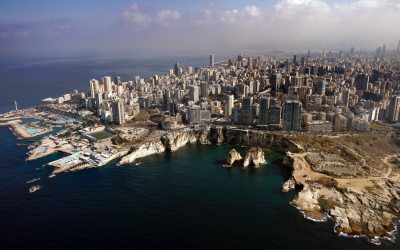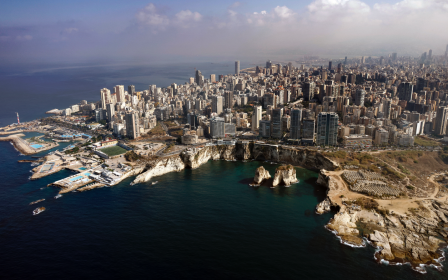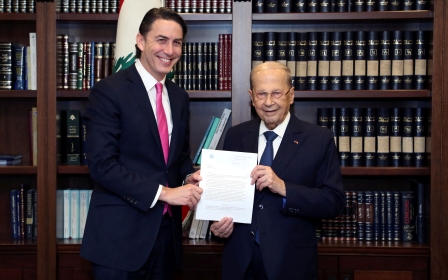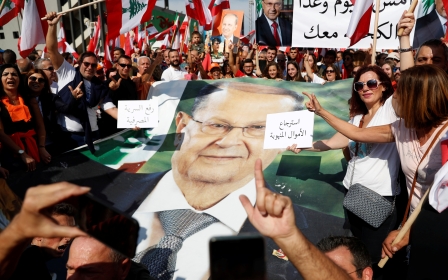Lebanon: Aoun vacates presidential palace leaving power vacuum
Michel Aoun, the 89-year-old Christian president who presided over Lebanon's cataclysmic financial meltdown and the deadly Beirut port blast, left the presidential palace on Sunday with his term ending, leaving a void at the top of a failing state.
Parliament has so far been unable to agree on a successor in the role, which is reserved for a Maronite Christian and has the power to sign bills into law and appoint new prime ministers.
Aoun's departure leaves Lebanon in the unprecedented situation of having a presidential vacuum and a caretaker cabinet with limited powers, as the premier-designate has been unable to form a government for six months.
In an interview with Reuters a day before his departure, Aoun said Lebanon was sliding into "constitutional chaos", given the lack of clarity over what prerogatives the caretaker cabinet and the parliament should each have.
On Sunday, hundreds of Aoun's supporters gathered at Baabda Palace to say farewell, wearing the orange associated with his Free Patriotic Movement (FPM) party. Some well-wishers carried portraits of him as president and from decades ago when he served as an army commander.
New MEE newsletter: Jerusalem Dispatch
Sign up to get the latest insights and analysis on Israel-Palestine, alongside Turkey Unpacked and other MEE newsletters
Therese Younes, 16, said she had backed Aoun since she was eight and was sad to see him go.
"If I was 18 years old, I would have left the country. There's no Lebanon left after Michel Aoun," said Younes.
Parliament has convened four times to try to elect a successor to Aoun, but no candidate has won a majority.
The influential Maronite Christian cleric Patriarch Beshara al-Rai on Sunday blamed politicians and parliamentarians for leaving the "presidency in a vacuum, either deliberately, or out of stupidity or selfishness".
'Worst president in Lebanon's history'
During Lebanon's 1975-1990 civil war, Aoun served as commander of Lebanon's army and the head of one of two rival governments.
After 15 years in exile, he returned to Beirut and allied with Hezbollah, a move that lent the armed group important Christian backing and ultimately helped him become president in 2016.
His six-year term saw the army fight off militant groups on the Syrian border in 2017 with Hezbollah's help and pass a new electoral law in 2018.
In his final week, he signed on to a US-mediated deal delineating Lebanon's southern sea border with Israel, paving the way for possible maritime gas discoveries.
While his supporters have hailed those achievements, his critics say they were overshadowed by the 2019 financial meltdown, which has pushed more than 80 percent of the population into poverty, and the massive 2020 blast at Beirut's port that killed more than 220 people.
"He was by far the worst president in Lebanon's history" said Michel Meouchi, a 41-year-old lawyer and father. "I prefer a void in the presidency to him."
Son-in-law's ambitions
Aoun later said he had known about the chemicals stored at the blast site and told other authorities to take action. Victims' families said he should have done more.
He declined to comment on the blast on Saturday and said his presidential powers were not wide enough to address the economic crisis.
Aoun left the palace a day before his term officially ends. Arriving at his residence in Rabieh, he was greeted by Gebran Bassil, his son-in-law and the current head of the FPM.
"Gebran after his father-in-law!" said the waiting crowds.
Bassil, a parliamentarian with presidential ambitions, was sanctioned by the United States in 2020 for alleged corruption, but he denies the charges.
Aoun on Saturday said the sanctions would not stop Bassil from becoming president and that they could be "removed" if he were to be elected.
Middle East Eye delivers independent and unrivalled coverage and analysis of the Middle East, North Africa and beyond. To learn more about republishing this content and the associated fees, please fill out this form. More about MEE can be found here.





